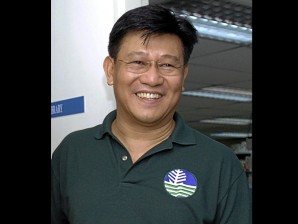DENR to probe dumping of waste on Subic Bay
MANILA, Philippines—Environment Secretary Ramon Paje has ordered an assessment of the toxicity levels and environment impacts of hazardous wastes allegedly dumped in waters off Subic last month to determine sanctions against the alleged polluter, a US Navy contractor.
The Department of Environment and Natural Resources will oversee a technical conference scheduled Monday to discuss what ought to be done after the alleged dumping of liquid wastes collected from US ships by the tanker MT Glenn Guardian, Paje said.
The environmentalist groups Greenpeace and EcoWaste Coalition also weighed in on the incident, saying Glenn Defense Marine Asia, a Malaysian company servicing American ships in the Philippines and other countries, must be held accountable for the environmental crime.
“Based on the technical conference, we will recommend sanctions on the company that dumped the wastes under the Clean Water Act and based on the Marpol,” Paje said, referring to the International Convention for the Prevention of Pollution From Ships, of which the Philippines is a signatory.
The official said the Philippine Coast Guard, and not the DENR, was the agency mandated by law to enforce standards and regulations in offshore areas including the discharge of wastewater by ships.
The Coast Guard’s responsibilities include enforcing water quality standards in marine waters, a role it shares with the Department of Agriculture.
“The DENR’s role is oversight. But what we can do is guide agencies including the Coast Guard in building the case against the polluter,” Paje said in an interview by phone.
Even so, the DENR, through its Region III office, is now studying what approach to take in the recent Subic incident, including its detrimental effects on surrounding waters and marine life, Paje said.
Since the dumping took place in parts of the West Philippine Sea, it would be difficult to determine actual impacts, considering the “very high level of dilution” in the ocean, which Paje noted, “has no boundaries.”
Ira Beau Baconguis, Philippine program manager of Greenpeace Southeast Asia, said a deeper study of the type of toxic materials dumped in the ocean was important.
“The problem is we don’t know exactly what kind of wastes was dumped. The reports said oil and grease, and liquid wastes, but liquid wastes could mean anything,” she told a forum.
Baconguis said liquid wastes could include heavy metals from rust scraping, as well as paints and solvents.
“As long as we don’t have details like that, we can’t say what exactly will happen. We’re now trying to get in touch with our Subic partners to find out,” she said.
Greenpeace oceans campaigner Vince Cinches said actions taken by the government and civil society in connection with the dumping incident should be in the context of what he called “precautionary principle,” taking into consideration how it might affect the integrity of marine ecosystems.
“But at the same time, in order to determine the extent of the impact, they should make public their findings. If action is not done, it may negate all efforts to save the ocean,” he said.
In a statement on Friday, EcoWaste, an environmental watchdog organization with over 150 member groups nationwide, expressed deep concern over the reported dumping by MT Glenn Guardian of toxic liquid waste collected from the visiting US naval ship Emory Land.
The group urged the Subic Bay Metropolitan Authority to disclose the full results of the water sampling it commissioned, ascertain with the DENR the environmental laws and standards violated, and file appropriate charges against the company.
EcoWaste also rejected the excuse of the alleged polluter that the SBMA had no jurisdiction over it, and that its activity was covered by the Visiting Forces Agreement.
“The defense that the VFA offers an exemption in cases like these should prompt a Senate review of the treaty. Does the agreement imply that US vessels or vessels contracted by the US government to service their ships can freely and without any encumbrances dump their toxic and possibly radioactive wastes in Philippine waters?” it said.
“We urge the Department of Foreign Affairs, as well as the Senate, to articulate their views on this matter—with the public health and the national sovereign interest in mind,” EcoWaste said.
It added that the deliberate disposal of waste at sea by ships and other vessels runs against the 1972 Convention on the Prevention of Marine Pollution by Dumping of Wastes and Other Matter (or the London Convention) and its 1996 Protocol (or the London Protocol), which mandates that “all dumping is prohibited, except for possibly acceptable wastes” and “unless explicitly permitted.”
In May, the Philippines formally acceded to the London Protocol through the Instrument of Accession signed by President Aquino and deposited to the International Maritime Organization, EcoWaste said.
The London Protocol is binding on the Philippines effective on June 8, it added.
